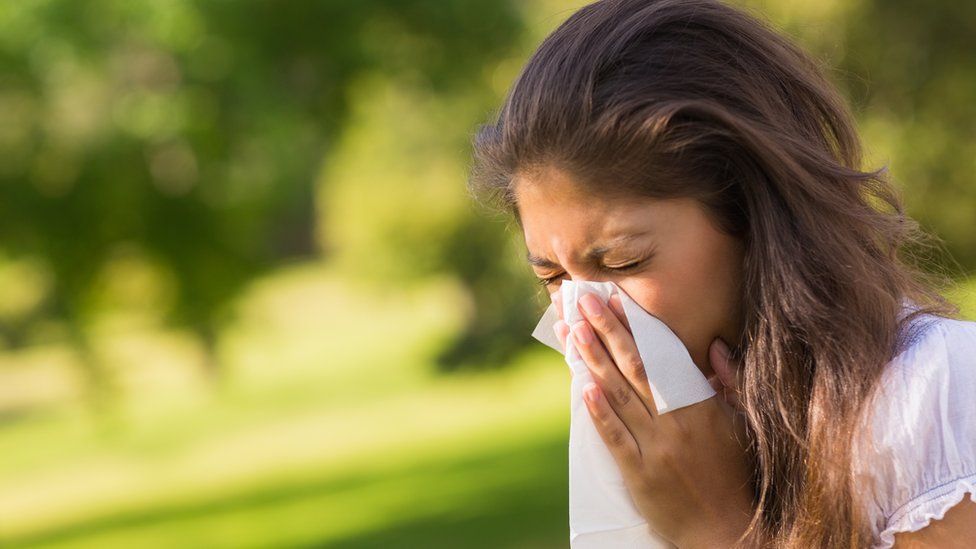'Cleaner world' increases allergy hospital admissions by 33% in five years
- Published

The number of hospital admissions for allergic reactions and anaphylactic shocks in England has increased by more than a third in the past five years.
Data from NHS Digital shows there were 29,544 hospital admissions in 2015-16 for allergic reactions.
That compares to 22,206 admissions in 2011-12.
Doctors say rising levels of cleanliness have lowered people's natural resistance to bacteria and dust which cause common allergies.
"The fact that we're living in a much cleaner world than a hundred years ago is the main factor behind the rise in the number of admissions for allergies," Dr Donald Hodge from the Leeds Teaching Hospitals Trust said.
"We've seen a huge increase in the number of referrals for children who have developed allergies, and this is undoubtedly because living in a cleaner world has lowered our ability to build up a resistance to substances like dust and pollen."
An allergic reaction is caused when the body's immune system reacts disproportionately to a substance usually considered harmless.
Lucy's story
Lucy Laxton, 11, from Lincoln, is allergic to 90% of foods and just coming into contact with them could cause her body to shut down.
"My sister used to have to wipe the table after breakfast, and I have a minder at school to make sure I eat the right things," she said.
Her mother, Lynne Luxton, discovered the severe problem while feeding Lucy when she was four months old.
"I was feeding her while eating my cereal with ordinary cow's milk," she told BBC 5Live.
"She jerked the bowl and two drops fell onto her sleep suit. In under two minutes her body blistered and she couldn't breathe. It was a 999 emergency and we've been dealing with it even since."
Listen to Lucy's story in full
Data about how many people in the UK suffer from an allergy is not conclusive but the charity Allergy UK claims that up to 50% of children are now diagnosed with an allergic condition.
NHS Digital will formally publish figures in November illustrating a steady rise in the number of hospital admissions where the primary reason for admission was due to an allergic reaction or anaphylactic shock.
The admissions data is not a count of the number of people with an allergy but a tally of the number of incidents hospitals have to deal with each year.
The provisional figures show that some hospital trusts have recorded large increases in the number of admissions.
The University College London NHS Trust reported a 10-fold increase in the number of admissions for allergies. In 2015/16 the trust dealt with 1,163 allergy-related admissions compared with just 103 in 2011/12.
The rise in the number of people being admitted to hospital suffering an anaphylactic shock which is a severe form of reaction has been slightly lower.
Across England the number of anaphylactic admissions has gone up by 19%.
Ruby Scott from York had an anaphylactic shock in 2014 after she ate a curry containing nuts.
"As soon as I ate the chicken korma my lips started to tingle and swell up and I started to feel really sick".
Ms Scott had specifically asked the Indian Garden restaurant in Easingwold to prepare the curry without nuts.
The owner, Mohammed Zaman, was jailed in May 2016 after he was found guilty of manslaughter after another customer died of a severe anaphylactic shock having eaten a dish that contained nuts.
Ruby said her condition means she will have a reaction even if she is in the same room as an open packet of nuts.
"Lots of people can't appreciate what its like but its weird to look at a meal and know that it could could kill you."
- Published29 January 2014